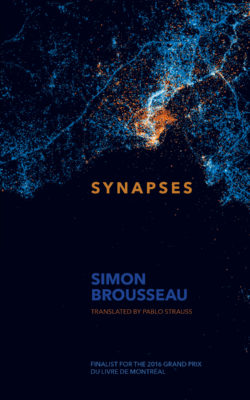We’ve all had the experience where our mind arbitrarily takes a snapshot, a freeze-frame that reverberates with the particulars that shaped our state of being at that moment in our lives. These flashes capture a near-simultaneous amalgamation of thought, emotion, and vivid sensory experience, a kind of neural artifact of an ever-changing self. But what if it were possible to compile the experiential snapshots of an array of different people in a single book? This is the ambitious challenge that Simon Brousseau has set for himself in his experimental novel Synapses.
Each snapshot, laid out two to a page, is a single meandering sentence brimming with a level of detail I would describe as baroque minimalist. (Pablo Strauss’s translation does a commendable job of grappling with the linguistic density on display here.) Brousseau’s use of the second-person voice has the effect of projecting these flashes onto the reader, laying bare the messy complexity of consciousness, the dance between the rational and irrational mind, and the hypocrisies that are fundamental to the human condition.

Synapses
Simon Brousseau
Translated by Pablo Strauss
Talonbooks
$16.95
paper
128pp
9781772012231
It would be fair to ask whether Synapses is even a novel to begin with. In many ways, it more closely resembles a collection of flash fiction, or, with its command of language, poetry. But each snapshot contains a seed of novelistic complexity, revealing our shared vulnerabilities through the relentless accumulation of shifting realities. The effect is a kind of gestalt of the human condition, where the whole manages to exceed the sum of its parts.
A recent tweet I happened upon by @G_S_Bhogal reads: “A good shortcut to empathy is to remember that every single person is exactly what you would be if you were them,” and this in many ways encapsulates Brousseau’s modus operandi. By situating the reader in a multitude of perspectives, he pushes the limits of human empathy in ways that a traditional novel cannot.
And yet, while Brousseau explores many dimensions inherent to the deeply human experience of having a body, only one of these 225 pieces refers directly to race. In a project that aspires to represent a maximum variety of viewpoints, the lack of racial awareness feels like a lost opportunity. I imagine Brousseau was going for a kind of universalism of perspective – the situations described in the book could be experienced by a person of any background – but by overlooking race as a factor that influences a person’s worldview, he flattens out the diversity of potential subjectivities in his work.
I found myself reading Synapses in short bursts. The barrage of people’s innermost thoughts, cast onto you one after another, can make for a demanding reading experience. This isn’t a weakness of the work itself, but more a testament to its stylistic intensity. If “hell is other people,” then Brousseau has found a way to make that hell a fascinating place to visit. mRb






0 Comments